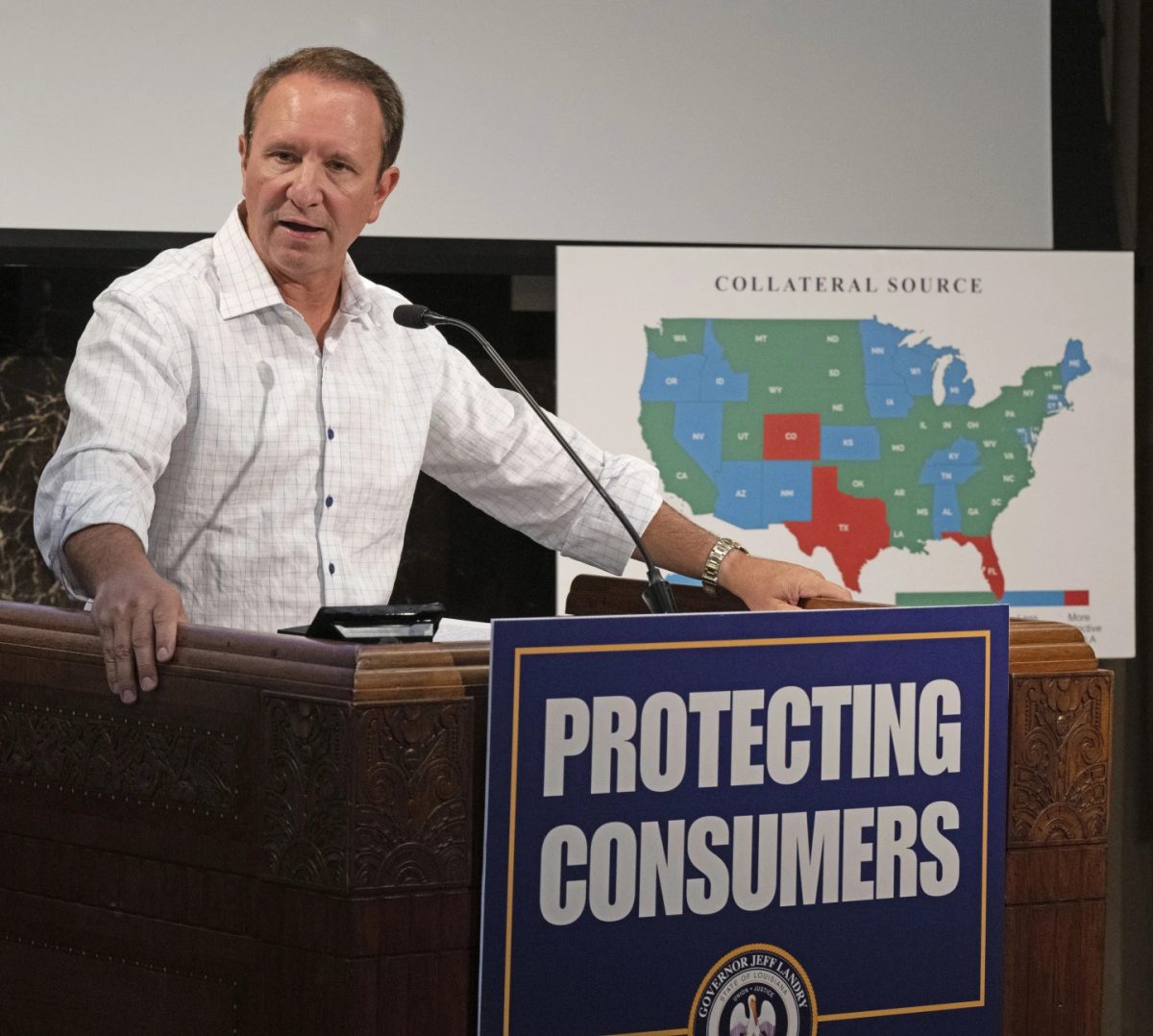The bars on the edge of LSU’s campus have been accused of having a racist dress code and enforcing it on mostly men and people of color.
This strip of bars is called Tigerland. It is a popular spot for college students to go to and attending is part of University tradition. They are like any other college bar: dirty, sloppy and full of drunk college-aged patrons. Almost no one would call these bars upscale, so why do they enforce a dress code?
In 2003 the NAACP encouraged a boycott of Tigerland, located on the corner of Nicholson Drive and Jennifer Jean Drive. The bars were still full the day of the boycott. I don’t think things would be different today. The usual patrons of the bar are white fraternity and sorority members. The dress codes don’t affect this demographic.
One student who faced the consequences of the dress code is University senior Zach Nunez. Nunez was let into the Tigerland bar Mike’s, but then was escorted out by bouncers nearly an hour later because he was wearing a necklace.
“They decided to take my money,” Nunez said. “And then thirty minutes to an hour later said ‘Sorry, you can’t be here.’ They didn’t offer my money back. I didn’t punch anyone and didn’t do anything.”
Nunez felt as though he had been singled out, in comparison to some that did not face the same treatment.
“I see other guys there with chains and jewelry on,” Nunez said. “Why aren’t they kicking them out? Why am I the one being targeted? And I really didn’t wanna go back for a while.”
However, Mike’s bartender Olivia Gower does not see an issue with the dress codes and how they make certain customers feel.
“I never really paid much attention to the dress code particularly,” Gower said. “I guess this was because there were bigger issues at hand, like me making money, than worrying about what people were wearing.”
On the issue that some feel as though the dress codes are based on racial stereotypes and are offensive, Gower did not budge on their enforcement.
“This can be an issue to some people,” Gower said. “But I do believe that a private establishment can choose to not let someone in because they aren’t dressed properly.”
The owners of Reggie’s and Mike’s declined to be interviewed.
University junior Charles Nathaniel Steptoe III said he doesn’t think he should have to choose a different bar. He said he is a student and should be able to have the college experience that any other student has.
“It’s sad that like, when I first came here, I was told Tigerland was racist,” Steptoe said. “They didn’t say any particular bar, they just said don’t go to Tigerland period. It’s just sad I had to be warned about it.”
Steptoe said he thinks the dress codes are stereotypes of black people. He said the banned clothes are things predominantly black people wear because of their culture.
“When you’re saying no ripped jeans and no chains and no solid colors, that’s not you directly saying ‘I don’t want black people here,’” Steptoe said. “But that is you saying you don’t want black people here.”
Nunez said he thinks that if someone pays to be in your establishment, they should be treated with a certain amount of respect.
“Tigerland in general is a horrible place, honestly,” Nunez said. “Like, I’m not a huge fan of going out to begin with, but when they put people in this situation where they don’t wanna go out… they know they’re not gonna lose money so that’s why they act like this. They think they can get away with it.”
Reggie’s bar doorman Garrett, who declined to give his last name, has been working there for almost a year. He said the dress code is enforced to make people look presentable because Reggie’s doesn’t want anyone coming in off the street.
Their dress code is mostly enforced on men. Even women have noticed how the scales tend to tip in their favor. University junior Avery Bracken took note of the relaxed rules towards girls.
“I’ve probably seen three girls entire butts out in Tigerland, and that’s never an issue,” Bracken said. “They’ve never been kicked out.”
This shows that the Tigerland bars do not care about what clothes people are wearing, but that they care about who is wearing the clothes. White women can get away with wearing just about anything. But a black man can’t even get in with earrings in.
Bracken has also noticed incidents of racism, calling to mind one that made her particularly uncomfortable.
“They were talking about how JL’s finds reasons to not let black people in.“ Bracken said. “They had no problem with going there and I was like ‘maybe we should not support them. Like do y’all not see the problem?’”
Bracken feels a call to action needs to happen as soon as possible.
“If people stop giving them money because they’re racist, they’re gonna do something to fix it,” Bracken said. “Because they’re gonna do whatever they can to stay open.”
Garrett said his boss gave him the list of rules and he just follows them. He, like I’m sure most other workers, don’t care what they are enforcing they just care about getting paid. This isn’t his fault, but it does show that when people don’t care about things that don’t affect them then nothing changes.
This shows a lack of empathy. The white fraternity men and white employees of the bars are not affected by the dress code, therefore it is not going to change. This same thinking is paralleled in modern day politics. The white men who make laws about immigration, women’s bodies and education do not care who these laws affect.
“White, black… whatever color you are, it doesn’t matter, everybody follows the same dress code,” Garrett said. “I’m white and I turn away white people all the time. I’ve been called racist before. I have black friends who come in all the time. It’s not meant to discriminate against race.”
The erasure of color doesn’t help racism. The term color blindness in reference to race is just another way to say you would rather not think about racism instead of doing something about it.
LSU multiculturalism professor Tina Harris used to work at the University of Georgia and noticed similar trends at the bars around that university.
“People had an understanding of the informal policy, that later became formal,” Harris said. “The policies showed racial prejudice and racial discrimination. The bars decided that they were going to have a policy that was going to let people know we don’t want people like them coming in here. It was specifically targeted against African Americans.”
Harris said the policies at those bars were worded in a specific way so people couldn’t detect that they were blatantly discriminating.
“It wouldn’t be ‘you can’t come in here because you’re black,’ but they would describe stereotypical clothing or style that would be associated with African Americans,” Harris said. “From what students have told me, it’s the same type of thing that is happening here.
Harris said the bars may not perceive their policy as being racist, but if they looked closely at the different descriptions of clothing they would see what they are describing is certain racial ethnic groups.
“We all have stereotypes of what someone would wear if they like country music,” Harris said. “They would wear: cowboy boots, boot cut jeans, plaid shirts. If they had a sign that had all those clothing items on there, it would almost be the same thing.”
Harris said this example doesn’t have the same history that racial discrimination does, but it does work to show the parallel between the two. She said you can describe how someone is dressed and think that it is very innocent, but the bars know that they are singling out attire that is associated with a specific racial ethnic group.
Nunez said he wants to see students not just roll over to what makes them uncomfortable or to what they think is wrong.
“It’s a conversation that needs to be had,” Nunez said. “Because if they’re aware we’re actually taking notice of this maybe they’ll start cleaning up their act.”
The bars in Tigerland aren’t going to change their dress code and who they enforce it on if everyone just stands back and allows them to act like this.
Letter to the editor: ‘Racist’ Tigerland dress code unlikely to change unless call to action taken
December 6, 2019
The Tigerland sign sits on Bob Pettit Blvd. on Thursday, Oct. 24, 2019.
More to Discover










